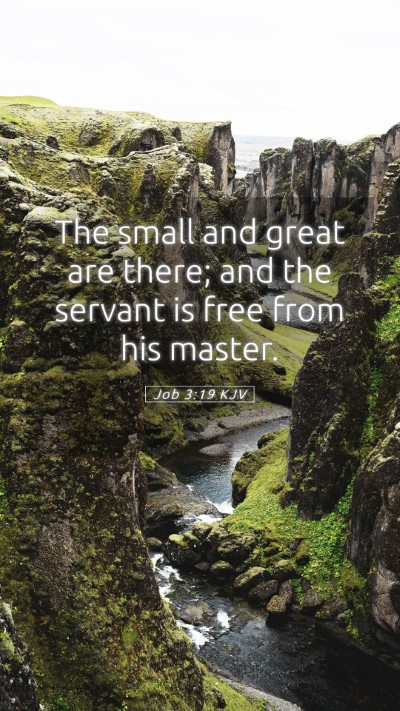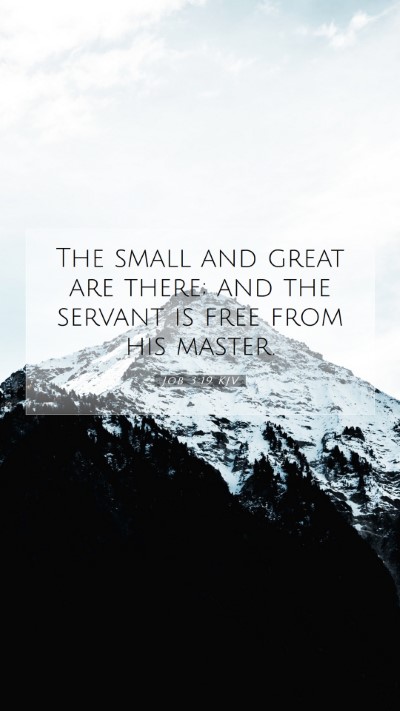Old Testament
Genesis Exodus Leviticus Numbers Deuteronomy Joshua Judges Ruth 1 Samuel 2 Samuel 1 Kings 2 Kings 1 Chronicles 2 Chronicles Ezra Nehemiah Esther Job Psalms Proverbs Ecclesiastes Song of Solomon Isaiah Jeremiah Lamentations Ezekiel Daniel Hosea Joel Amos Obadiah Jonah Micah Nahum Habakkuk Zephaniah Haggai Zechariah MalachiJob 3:19 Meaning
What is the meaning of Job 3:19?
The small and great are there; and the servant is free from his master.
Job 3:19 Bible Verse Meaning
Understanding Job 3:19: A Comprehensive Commentary
Bible Verse: Job 3:19 - "The small and great are there; and the servant is free from his master."
In this verse, Job expresses a deep sense of despair and longing for death, reflecting on the equality found in death that transcends social and earthly hierarchies. Here, we delve into the meanings, interpretations, and insights from several public domain commentaries to provide a rich understanding of this scripture.
Summary of Insights
Job 3:19 reveals profound themes of suffering, equality in death, and the universality of human experience. Commentators highlight several key points:
- Equality in Death: Matthew Henry notes that death brings an end to all distinctions among people, as both the small and great reach the same fate. This serves to underscore a significant aspect of human existence—the inevitability of mortality.
- The Servant and the Master: Albert Barnes elaborates on the relationship between the servant and the master, emphasizing that in death, all earthly bonds and statuses dissolve. This reflection invites readers to ponder their earthly priorities.
- Job's Lament: Adam Clarke interprets this verse within the broader context of Job's lamentation. Job is voicing the pain of his suffering and the frustration that those who hold power and status continue to exist while he endures torment.
- Existential Questions: The verse prompts deeper existential questions about life, suffering, and what lies beyond. It serves as a passage for reflection on whether one's status in life matters in the grand scheme of existence.
Detailed Commentary Analysis
1. The Perspective of Matthew Henry
Matthew Henry provides a theologian's insight on Job's expression of grief. He explains that the phrase "the small and great are there" emphasizes the leveling nature of death, which does not differentiate based on one’s status in life. It illustrates the futility of earthly aspirations in the face of mortality. Henry’s thoughts lead us to reflect on our priorities and relationships, and what truly holds meaning in life.
2. Albert Barnes' Interpretation
Albert Barnes presents a practical view of Job's statement, considering its socio-economic implications. He suggests that Job laments the loss of his societal rank and connections in his suffering. The imagery of the "servant being free from his master" illustrates that death alleviates all forms of oppression and earthly struggles, offering a somber equality for all who face it. Barnes draws attention to the transient nature of life and the importance of humility before God.
3. Adam Clarke’s Contextual Analysis
Adam Clarke dives deep into the context of Job 3:19, relating it to the overarching narrative of Job’s trials. He notes that this verse belongs to Job's desire for relief from his suffering and a wish for death to find peace. Clarke encourages readers to consider the emotional turmoil and pain that Job embodies, making his words resonate with those who have suffered similarly in life.
Theological Implications
Exploring Job 3:19 raises significant theological inquiries regarding suffering and divine justice. Various interpretations highlight how Job’s misery leads to profound insights about human existence and the nature of God’s plan amid pain.
Universal Suffering
The commentators converge on a central theme: all humanity faces suffering. Death's inevitability creates a shared experience that transcends class, social status, and earthly accomplishments, prompting readers to seek deeper spiritual truths.
Mortality as a Great Equalizer
This verse spotlights mortality as the ultimate equalizer. Life’s distinction becomes meaningless when placed against the backdrop of death, suggesting that earthly achievements and struggles hold little weight in eternity.
Applying Job 3:19 to Daily Life
While Job's declaration reflects a moment of despair, it also encourages reflection on how we live our lives. Here are some applications drawn from this verse:
- Encouragement in Suffering: Recognizing that others have struggled and that eventual relief comes through death can provide comfort during painful times.
- Humility in Life: Understanding that status holds no value beyond the grave promotes humility and empathy towards others regardless of their social standing.
- Reflection on Legacy: Individuals are prompted to consider how they want to be remembered, encouraging a focus on relationships and spiritual values rather than material success.
Related Bible Verses
Job 3:19 resonates with various other scriptures that also delve into themes of mortality and the human condition:
- Ecclesiastes 3:19-20 - "For what happens to the children of man and what happens to the beasts is the same; as one dies, so dies the other." This verse highlights the common fate of all living beings.
- Psalms 49:10 - "For he sees that even wise men die; the fool and the stupid alike must perish." This reflects the idea that wisdom and foolishness both result in death.
- Hebrews 9:27 - "And just as it is appointed for man to die once, and after that comes judgment." This reinforces the concept of mortality and accountability.
Conclusion
Job 3:19 serves as a poignant reminder of the transient nature of life and the ultimate equality found in death. Through the insights of scholars such as Matthew Henry, Albert Barnes, and Adam Clarke, we gain a richer understanding of this scripture's profound implications on our lives and faith. Engaging with this verse through various perspectives enhances our Bible verse understanding and leads to deeper scripture analysis and biblical exegesis.


